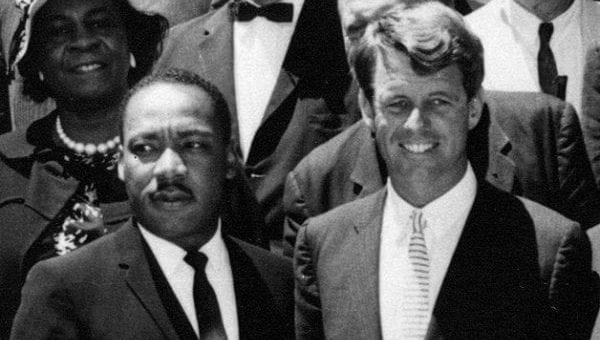 It’s now 50 years since U.S. Sen. Robert F. Kennedy was murdered on the night of his victory in the California Democratic presidential primary, on June 6, 1968. The shooter, a Palestinian immigrant with Jordanian citizenship, was apparently angry at Kennedy’s support for Israel.
It’s now 50 years since U.S. Sen. Robert F. Kennedy was murdered on the night of his victory in the California Democratic presidential primary, on June 6, 1968. The shooter, a Palestinian immigrant with Jordanian citizenship, was apparently angry at Kennedy’s support for Israel.
Kennedy, generally referred to as Bobby, was a controversial figure in life. To some, he was a ruthless, rich opportunist who believed the Kennedys were entitled to the White House. To others, he was an idealistic politician who’d conquered his earlier demons and was en route to secular sainthood.
Even a half-century on, the tantalizing question remains – unanswered and perhaps unanswerable: If Bobby Kennedy hadn’t been killed, would he have been elected president in 1968?
Like a lot of people who mourned John F. Kennedy’s death, I was rooting for Bobby. When he grew his hair longer and began criticizing U.S. President Lyndon Johnson’s Vietnam policy, he seemed to be attuned to the mid-1960s zeitgeist. He was like a rock star.
To my chagrin, though, Bobby Kennedy hesitated when it came to finally throwing down the gauntlet to Johnson. He was akin to someone who’d walk to the edge of the diving board and then take several steps back. So it was left to U.S. Sen. Eugene McCarthy to challenge Johnson in the 1968 New Hampshire primary.
Then, within days of McCarthy’s surprisingly impressive New Hampshire performance, Kennedy jumped into the race. That seemed to vindicate the opportunism charge but my enthusiasm was undimmed. I expected Kennedy to quickly blow McCarthy away.
He didn’t.
The first head-to-head was in Indiana on May 7 and Kennedy prevailed with 42 per cent to McCarthy’s 27 per cent, the remaining 31 per cent going to Gov. Roger Branigin, who was running with a view to controlling the state’s delegation at the nominating convention. While it was a win, it was somewhat underwhelming. The Bobby Kennedy juggernaut wasn’t sweeping everything before it.
A more decisive win in Nebraska the following week – 52 per cent to 31 per cent – gave the impression that the ship had righted itself but Oregon put the lie to that on May 28. McCarthy beat Kennedy by six points and the hitherto unthinkable had happened. A Kennedy had been defeated in a Democratic race!
The ultimate Kennedy-McCarthy showdown came in California on June 4, with Kennedy squeezing out a four-point win. Then the assassin’s bullet put an end to him.
So had Bobby Kennedy cleared the way to the Democratic nomination and ultimately the presidency?
My hindsight guess is that the answer is no.
American politics 50 years ago was very different from today. Back then, only 14 of the 50 states had presidential primaries and the majority of convention delegates were selected through a process that gave very substantial weight to party bosses and those – such as labour leaders – who wielded significant influence in terms of ostensibly delivering voters. For the most part, these players weren’t in Kennedy’s corner.
Although Johnson had been their initial choice, when he withdrew on March 31 they mostly migrated their support to Vice-President Hubert Humphrey. Despite his close political ties to the Kennedy family, even Chicago Mayor Richard Daley backed the vice-president.
Humphrey was shrewd.
Eschewing direct participation in the primaries, he set about amassing delegates the old fashioned way and established a solid lead by early June. A June 2 Gallup poll underlined the source of his organizational strength. He was favoured by 67 per cent of Democratic county chairmen compared to Kennedy’s 19 per cent.
It would also be inaccurate to suggest that Humphrey’s only support came from the party’s power structure.
For instance, an April 28 Gallup poll showed Kennedy just three points ahead of Humphrey among Democratic voters generally. And a May 6 Harris poll had Humphrey in front by 11 points. In fact, that particular poll saw Kennedy as the only Democrat who would actually lose to Republican Richard Nixon in a general election.
Bottom line: I don’t believe Kennedy would’ve prevailed at the nominating convention. While he’d have worked tirelessly to peel delegates away from the vice-president, the climb would have been too steep.
And working behind the scenes, Johnson – whose relationship with Kennedy was one of mutual loathing – would’ve pulled every imaginable string to ensure that it didn’t happen.
Troy Media columnist Pat Murphy casts a history buff’s eye at the goings-on in our world. Never cynical – well, perhaps just a little bit.
The views, opinions and positions expressed by columnists and contributors are the author’s alone. They do not inherently or expressly reflect the views, opinions and/or positions of our publication.

